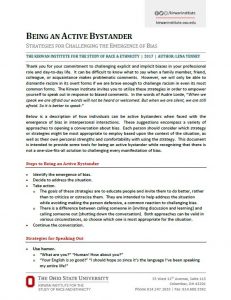Thank you for your commitment to challenging explicit and implicit biases in your professional role and day-to-day life. It can be difficult to know what to say when a family member, friend, colleague, or acquaintance makes problematic comments.
However, we will only be able to dismantle racism in its overt forms if we are brave enough to challenge racism in even its most common forms. The Kirwan Institute invites you to utilize these strategies in order to empower yourself to speak out in response to biased comments. In the words of Audre Lorde, “When we speak we are afraid our words will not be heard or welcomed. But when we are silent, we are still afraid. So it is better to speak.”
This handout contains actionable strategies and model language for how to speak up when bias emerges in everyday conversation. Please utilize this handout as an educational resource for yourself and others!
